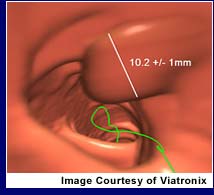
Virtual Colonoscopy
Even though it is estimated that over 90 percent of patients with colorectal cancer could be cured if detected at an early stage, colorectal cancer remains the second leading cause of cancer death in the nation. This is believed to be due to the fact that the screening rate for the disease lags far behind that of other cancers, with only 30 to 40 percent of people over 50 years old actually being screened for colorectal cancer.
One highly publicized screening method for colorectal cancer is colonoscopy–a method that involves the insertion of a six-foot long flexible endoscope into the colon of a sedated patient. Despite the probable effectiveness of colonoscopy and its highly accurate results, it has not been implemented on a large-scale nationwide. Resistance to the test is partly due to its highly invasive nature and the fact that sedatives administered during the exam require recovery time and leave the patient groggy and unable to drive home on their own. It is hoped that the development of a more convenient and non-invasive colorectal cancer screening test might increase compliance and ultimately reduce the mortality rates of the disease.
Another commonly used screening tool, the Fecal Occult Blood Test (FOBT), is a non-invasive and relatively inexpensive colorectal cancer screening tool that looks for traces of blood in the stool. This test, however, is not highly sensitive or specific–that is, it fails to identify colorectal lesions (polyps or cancers) that do not produce blood in the stool, and it also generates false-positive results from blood being present in the stool due to other diseases or disorders.
However, a new noninvasive method that is in the early stages of development may offer better sensitivity and specificity than an FOBT. The Multitarget Assay Panel (MTAP) test looks specifically for mutations in DNA found in the stool that are indicative of colorectal cancer. In this test, the presence of any of 21 specific DNA mutations known to be present in colorectal cancer, as well as changes in DNA structure, are used to diagnose colorectal cancer. Benefits of this test include the fact that it requires neither a prior bowel-cleansing regimen (as in colonoscopy or virtual colonoscopy) nor the use of any sedatives.
In a study published last year, Dr. Kuldeep Tagore and colleagues used the MTAP test in order to attempt to distinguish between healthy patients and those with colorectal cancer. The researchers looked at 80 patients with verified colorectal cancer and 212 control patients. The MTAP test correctly identified over 60 percent of the patients with colorectal cancer as having the disease, while only about four percent of control group patients were improperly diagnosed as having cancer. These numbers compare favorably to similar studies testing the effectiveness of FOBT that resulted in only about 35 percent of cancer patients being correctly diagnosed and about 6 percent of patients incorrectly identified as having cancer.
“Compared with historic FOBT results,” says Tagore, “the detection of DNA abnormalities in stool appears to be substantially more sensitive [for colorectal cancer], with comparable specificity. The MTAP as a noninvasive screening option may be useful in bringing a larger segment of the population into screening and help patients who can benefit most from colonoscopy.”
 NCI NewsCenter
NCI NewsCenter NCI Budget Data
NCI Budget Data Visuals Online
Visuals Online NCI Fact Sheets
NCI Fact Sheets Understanding Cancer Series
Understanding Cancer Series